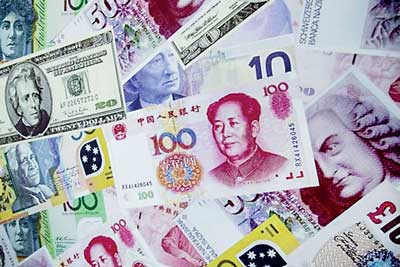Wednesday Feb 18, 2026
Wednesday Feb 18, 2026
Tuesday, 10 October 2017 00:00 - - {{hitsCtrl.values.hits}}
REUTERS: Sentiment towards most emerging Asian currencies soured in the last two weeks as the US dollar rallied on growing expectations that the Federal Reserve will hike interest rates later this year, a Reuters poll showed.
Investors were estimated to have reduced long positions on the Chinese yuan, the Indonesian rupiah, the Malaysian ringgit and the Thai baht, according to a poll of 12 analysts, traders and fund managers.
Last week, Fed Chair Janet Yellen said the central bank needs to continue gradual rate hikes despite broad uncertainty about the path of inflation.
Additionally, the Philadelphia Federal Reserve Bank President Patrick Harker said he still has “penciled in” an interest rate hike in December, and three more rate hikes next year.
Mostly upbeat US economic data and proposed tax reforms have added to the dollar’s buoyancy. The greenback posted its best weekly rise of 2017 last week.
For Asian currencies, bullish bets on the yuan fell to the lowest since April, weighed down by a series of weaker central bank fixings.
Traders believe Beijing has allowed the currency to soften in recent weeks amid worries that its recent sharp rise was starting to hurt China’s export competitiveness. Recent gains in the dollar have also added pressure.
The sharp reversal has shaved the yuan’s year-to-date gains against the greenback to around 4%, from 7.5% in early September, though most market watchers do not expect the central bank will allow it to weaken much further.
Meanwhile, bullishness on the rupiah has largely evaporated after unexpected back-to-back interest rate cuts by the central bank in August and September. Policymakers are struggling to boost the economic growth rate, which stalled at around 5%.
Long positions on the baht fell to their lowest since March.
The poll also showed market participants turned bearish on the Indian rupee for the first time in nearly nine months after economic growth unexpectedly cooled to its slowest pace in three years.
The Reserve Bank of India acknowledged the weaker outlook on Wednesday, cutting its end-March projection for gross value added – the indicator of economic growth it prefers – to 6.7% from its previous forecast of 7.3%.
In other currencies, investors increased short positions on the Korean won to their highest since January with continuing geopolitical tensions on the Korean Peninsula dampening risk appetite among investors in the region.
Last week, the won depreciated to its weakest level since July as North Korea’s leader Kim Jong Un and US President Donald Trump continued to exchange war-like threats and insults over the North’s missile development program.
South Korea believes the North could make further provocations in coming weeks.
The Asian currency positioning poll is focused on what analysts and fund managers believe are the current market positions in nine Asian emerging market currencies: the Chinese yuan, South Korean won, Singapore dollar, Indonesian rupiah, Taiwan dollar, Indian rupee, Philippine peso, Malaysian ringgit and the Thai baht.
The poll uses estimates of net long or short positions on a scale of minus 3 to plus 3. A score of plus 3 indicates the market is significantly long US dollars.